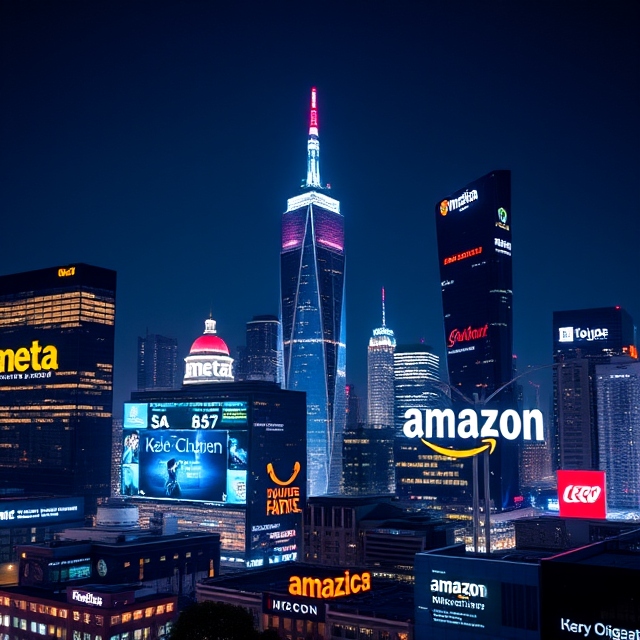
Economic and Geopolitical Power: U.S. tech giants like Meta, Google, and Amazon significantly boost the U.S. economy and serve as tools for global soft power influence.
Data-Driven Hybrid Warfare: These companies face allegations of manipulating political landscapes worldwide, influencing elections, and shaping public opinion through algorithms.
Digital Sovereignty as a Priority: Nations like India emphasize the need for digital independence to safeguard data security and counter potential geopolitical threats.
America is home to some of the world’s largest companies, particularly in the tech sector, which have played a significant role in the country’s economic rise. These big corporations, like Meta, Google, Apple, Amazon, and others, are responsible for shaping the U.S. economy and contributing immensely to its success. Such is the influence of big tech that it single-handedly generated $2 trillion in wealth for the United States in 2023, accounting for almost 9% of the country’s overall GDP. This remarkable contribution serves as a cornerstone of America’s success and highlights how these companies have propelled the United States to its position as a global superpower.

Big tech is not just an economic powerhouse for the United States but also a critical tool in projecting its influence globally. These companies have created a significant and positive shift, making American brands household names across the globe. Companies like Apple, Google, Amazon, and Meta have billions of users, each contributing to the unique identity of American innovation. Their influence extends beyond economics, reshaping the culture, judiciary, and legal systems domestically. However, it is not just about user engagement or the so-called hybrid model of influence. Big tech has become a soft power tool for the United States, propagating American culture and values worldwide. More importantly, the American government often leverages big tech to influence global dynamics, demonstrating the symbiotic relationship between these corporations and the nation’s geopolitical strategy.

The big tech companies of the United States, like Google and Meta, have been accused of being used for political interests, sometimes even to create political transitions in other countries. A whistleblower from Meta in 2018 revealed that former advisor Steve Bannon utilized data from nearly 50 million Meta users to target the American audience. There have also been many accusations from Republicans against Google, alleging that it has worked in favor of the Democratic Party by highlighting Democratic ideas and rejecting Donald Trump’s views, labeling them as threats.
A similar phenomenon has been observed in India, where evidence suggests that content on Meta and Google critical of the current regime, particularly the BJP or Prime Minister Modi, was suppressed. At the same time, conservative ideas within India were rejected. This can be described as a form of hybrid warfare carried out by the United States to influence people’s perceptions and shape what they believe through the content they are exposed to. With the decline of print media, this reliance on social media has become a significant issue.
The United States’ use of its tech giants to influence global elections has sparked political controversies worldwide. For instance, in 2022, the Indian government strictly demanded compliance with its laws and regulations, forcing platforms to adhere to Indian rules. A similar incident occurred in Nigeria, where X was forced to shut down operations due to accusations of interfering in the country’s political affairs. A comparable situation was recently observed in Brazil, where the Supreme Court ordered X to cease its operations.
These developments are not coincidental. They reflect a broader pattern where big tech companies are alleged to influence political affairs across multiple countries. At present, we live in a time where data matters immensely. The billions of data points collected by these U.S.-based tech giants are stored on servers in the United States. This data can be—and allegedly is—used to understand the cultural, political, economic, and sociological psyche of people worldwide. Based on this understanding, content is tailored, and suggestions are fed to users through algorithms that align with specific interests and narratives.
It is no surprise that the adversaries of the United States, such as China and Russia, do not use its big tech platforms. For instance, major companies like Google and social media platforms have been shut down in these countries. The simple reason is their understanding of how personal data can be used against them, not only in terms of economic strategies but also in matters of national security.
It is high time for countries to not only strive for military self-reliance but also to achieve digital independence. The mode of warfare has evolved; it is no longer limited to battles fought on the ground. Modern warfare is increasingly determined by data. Nations that can protect their data and prevent its exposure will emerge victorious in this new paradigm.
This is an area where the Indian government must focus on for the long run. Achieving digital sovereignty will be crucial for safeguarding national interests in this era of data-driven geopolitics.
References:
1)https://amp.theguardian.com/news/2018/mar/17/cambridge-analytica-facebook-influence-us-election
Satish Chogule is pursuing a Masters in Political Science at the University of Kolhapur, Maharashtra. He has contributed to several online platforms on international affairs and global developments. Views expressed are the author’s own.
